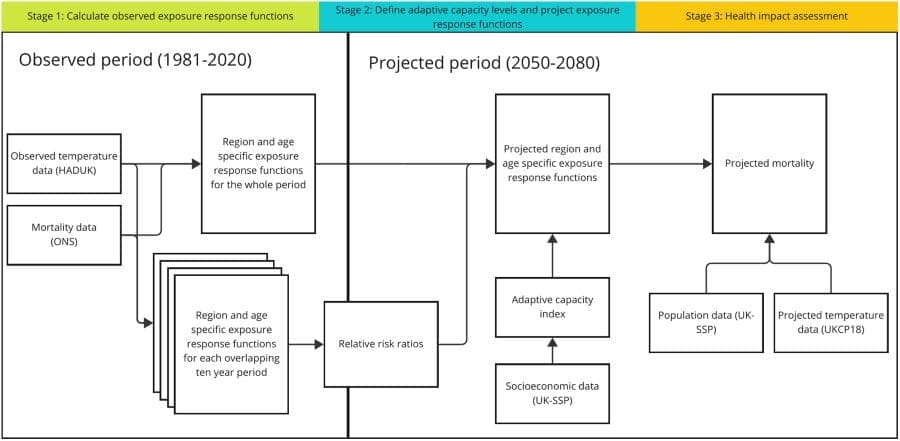Summary:
Heat-related deaths in England and Wales could increase up to fifty times over the next five decades as a result of climate change, rising temperatures, and an ageing population, according to new research published in PLOS Climate. The study, conducted by researchers from University College London and the London School of Hygiene & Tropical Medicine, presents the most detailed projections to date of future heat-related mortality across nine government regions, drawing on 15 combined climate and socioeconomic scenarios.
Even under the most optimistic scenario – involving only 1.6°C of global warming and widespread adaptation – annual heat deaths are expected to rise from a baseline of 634 to over 4,500 by the 2070s. In the worst-case scenario, involving 4.3°C of warming and limited adaptation, deaths could climb to more than 34,000 annually.
The researchers examined how factors such as ageing, regional climate variation, inequality, and infrastructure – including potential power outages during heatwaves – shape vulnerability. They also assessed how various adaptation strategies, from passive cooling to urban greening, could reduce health risks.
“Over the next fifty years, the health impacts of a warming climate are going to be significant,” said senior author Dr Clare Heaviside. “We have to start now.”

Annual heat-related deaths projected to increase significantly due to climate and population change
The annual number of heat-related deaths in England and Wales is set to rise up to fiftyfold over the next 50 years because of climate change, finds new research by UCL and the London School of Hygiene & Tropical Medicine.
Their paper analysed the impacts of 15 different combined climate change and socio-economic scenarios over the next fifty years, comparing different levels of warming, different amounts of adaptation to protect against the effects of a warming climate, aging populations, regional climatic differences and the potential impact of power outages – a new approach for heat impact projections. Together, they are the most comprehensive projections for the impact of climate change on the population of England and Wales for the next century.
The researchers found that even under the most optimistic scenario, associated with 1.6 degrees of warming over preindustrial levels by the end of the century and with high levels of adaptation, the annual number of heat-related deaths will increase up to sixfold.
Today’s baseline of 634 annual heat-related deaths will rise to 3,007 per year in the 2050s, 4,004 in the 2060s and up to 4,592 in the 2070s. The worst-case scenario, with 4.3 degrees of warming over the same period and minimal adaptation, would see up to a more than fifty-fold increase in heat-related deaths to 10,317 in the 2050s, 19,478 in the 2060s, and 34,027 in the 2070s.
Potential adaptations could include steps such as adopting passive cooling systems like cool and green roofs, better building ventilation and heat management, active cooling systems such as air conditioning, shady urban forests and greater community support for vulnerable populations.
For comparison, the record-setting hot summer of 2022 saw 2,985 excess heat deaths, indicating a potential “new normal” by as early as the 2050s. For the low emissions scenario this would mean an additional 21 to 32 significantly hotter than average days per year, and an additional 64 to 73 such hot days under the high emission scenario.
Senior author, Dr Clare Heaviside (UCL Bartlett School Environment, Energy & Resources), said: “Our collaborative research paints a sobering picture of the consequences of climate change, under a range of potential social and economic pathways. Over the next fifty years, the health impacts of a warming climate are going to be significant. We can mitigate their severity by reducing greenhouse gas emissions and with carefully planned adaptations, but we have to start now.”
Over the next fifty years, the population of England and Wales is expected to age significantly, with the greatest increase in population size for those aged 65 and over by the 2060s. Most previous research into the future impact of heat mortality didn’t factor in the impact of an ageing population, leading to an underestimation of its mortality.
This study broke England and Wales into nine regions to analyse the impact of climate change in different areas. Generally, heat mortality rates in the North are projected to increase less than rates in the warmer south across the different scenarios, but there is some variation.
In addition, the researchers modelled different levels of adaptation for a warming climate and the outcomes it would have on heat-related mortality. This includes factors such as health infrastructure, levels of urbanisation, energy infrastructure, inequality, fossil fuel emissions, adoption of air conditioning or other passive cooling technologies.
They found that the more adaptation society undertakes, the lower the heat-related mortality. But, while under lower levels of warming, adaptation plays a more significant role in reducing mortality, under the higher levels of warming, its effectiveness is reduced.
To test the resilience of the various adaptations, the researchers modelled a power outage over ten consecutive hot days under the various adaptation scenarios under the projected highest level of warming.
They found that with the best adaptation, heat-related mortality wouldn’t increase with a disruption in power services because many of the adaptations such as shading, shutters and cool roofs are passive and don’t rely on electricity. However, in other, less well adapted scenarios where people rely more heavily on air conditioning, heat-related deaths would increase by up to 27% overall, with some regions seeing as high as a 75% increase in heat-related deaths.
Lead author, Dr Rebecca Cole of the Department of Public Health, Environments and Society at London School of Hygiene & Tropical Medicine, said: “How we as a society adapt to our changing climate will have a tremendous effect on people’s wellbeing. Our research shows how increases in heat-related deaths are not just a consequence of rising temperatures – they’re also driven by how we build our cities, care for vulnerable populations, and address social inequality. Concerted adaptation strategies are required, well in excess of those over the last 30 years.”
***
This research was supported by the National Institute for Health Research.
Journal Reference:
Cole R, Wan K, Murage P, Macintyre HL, Hajat S, Heaviside C, ‘Projections of heat related mortality under combined climate and socioeconomic adaptation scenarios for England and Wales’, PLOS Climate 4 (7): e0000553 (2025). DOI: 10.1371/journal.pclm.0000553
Article Source:
Press Release/Material by University College London
Featured image credit: kjpargeter | Freepik




